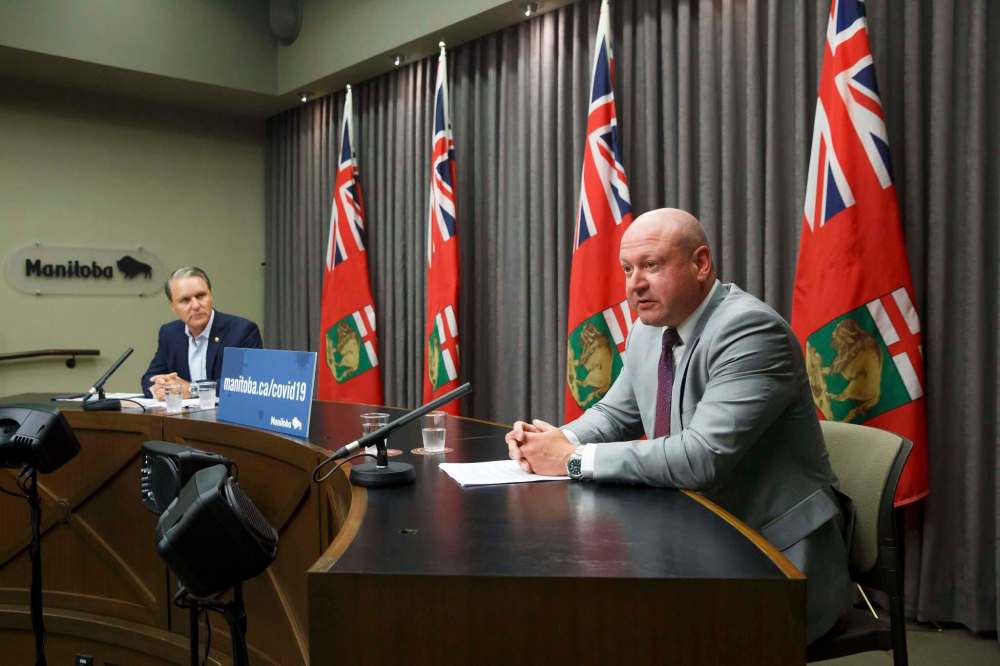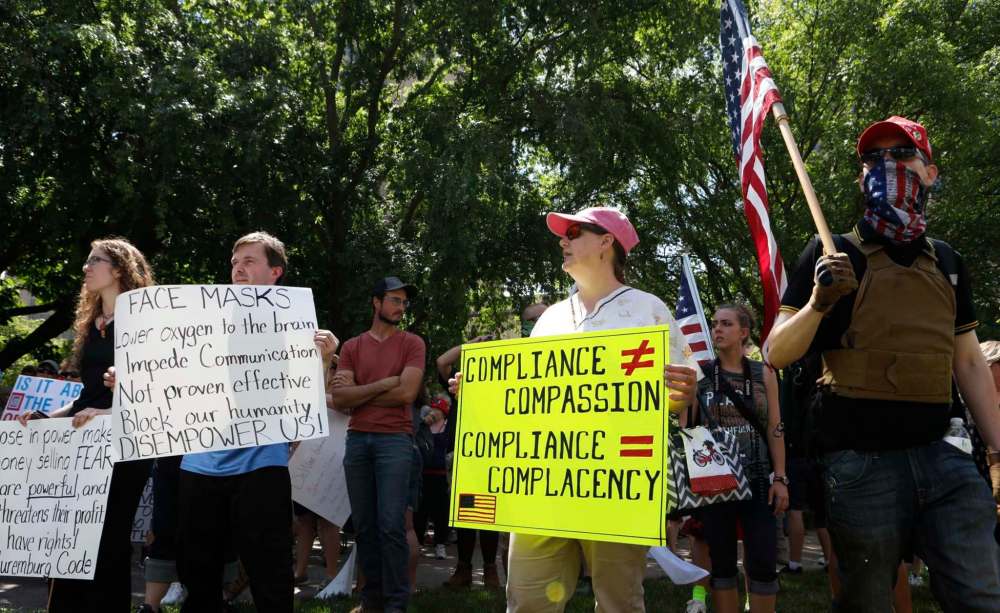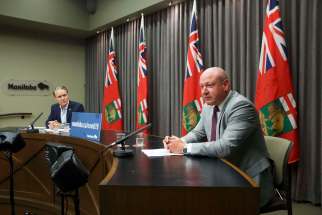Is it too much to ask? Why won’t Manitoba mandate masks?
Read this article for free:
or
Already have an account? Log in here »
To continue reading, please subscribe:
Monthly Digital Subscription
$0 for the first 4 weeks*
- Enjoy unlimited reading on winnipegfreepress.com
- Read the E-Edition, our digital replica newspaper
- Access News Break, our award-winning app
- Play interactive puzzles
*No charge for 4 weeks then price increases to the regular rate of $19.00 plus GST every four weeks. Offer available to new and qualified returning subscribers only. Cancel any time.
Monthly Digital Subscription
$4.75/week*
- Enjoy unlimited reading on winnipegfreepress.com
- Read the E-Edition, our digital replica newspaper
- Access News Break, our award-winning app
- Play interactive puzzles
*Billed as $19 plus GST every four weeks. Cancel any time.
To continue reading, please subscribe:
Add Free Press access to your Brandon Sun subscription for only an additional
$1 for the first 4 weeks*
*Your next subscription payment will increase by $1.00 and you will be charged $16.99 plus GST for four weeks. After four weeks, your payment will increase to $23.99 plus GST every four weeks.
Read unlimited articles for free today:
or
Already have an account? Log in here »
Hey there, time traveller!
This article was published 27/07/2020 (1963 days ago), so information in it may no longer be current.
It was hardly surprising the Winnipeg Airports Authority announced Monday it would require all passengers, visitors and employees at Richardson International Airport to wear non-medical face coverings starting Wednesday. The real surprise is why it didn’t happen sooner and why we aren’t invoking similar requirements in a broader array of indoor spaces.
Masks are now firmly part of the prescribed safeguards necessary to contain COVID-19, right up there with social distancing, hand washing and remaining at home if you are sick. Even so, many places including Manitoba have stopped short of making them mandatory.
Manitobans' fall fashion likely will include masks for indoor public spaces

Posted:
The province's chief public health officer says he can envision recommending the wearing of masks in all indoor public places as early as fall to help guard against the spread of the novel coronavirus.
In the Phase 4 re-opening plan announced last week by Premier Brian Pallister, there was no mention of masks at all in either the draft or final version. Manitoba is hardly alone in ignoring the potential benefits of mandating non-medical masks. But it could soon find itself behind the curve unless steps are taken to make masks part of our daily pandemic routine.
That is certainly what is happening in other parts of the country.
Earlier this month, Quebec announced mandatory mask requirements for all indoor spaces and this week will impose a similar measure on anyone riding public transit. Ontario has not issued a province-wide order, but cities like Toronto did in early July, making a mask mandatory in indoor spaces and transit.
What prompted Ontario and Quebec to jump on the mandatory mask bandwagon? This is where science begins to flex its muscle.
Different viruses have different capacities to remain airborne. HIV, for example, can only be transmitted via bodily fluid. Measles, on the other hand, can linger in the air for up to two hours.
COVID-19? Ever since it arrived, there has been no consensus around where it should be placed on the airborne-transmission spectrum. That debate was settled to a large extent in early July, when 239 infectious disease experts publicly challenged the World Health Organization to acknowledge that COVID-19 represents a potent airborne threat.
That was a seminal moment in our understanding of COVID-19. And yet, we’re still slow to respond now that the case for masks is stronger than ever. If you scan the science, it seems incomprehensible that we would be so laggard in adopting mandatory mask orders. Lamentably, our inability to assess scientific discoveries and then act decisively has been a hallmark of the global pandemic response.
COVID-19 may ultimately go down in history as the “if only” pandemic. As in, if only China had acknowledged the virus earlier. If only there had been a global cessation of air travel in January. If only social and economic distancing had been invoked earlier.
The next big “ if only” moment could come if we don’t move quickly to enforce mask use indoors. Of course, there are other perils that could arise if masks become mandatory.
In case you’ve been in a news bubble, masks have become a political and legal flashpoint in the global pandemic response. In some countries, the population has willingly embraced masks; in other places, mandatory mask use has prompted everything from outright skepticism to violence at any insistence a mask be worn.
In the United States, the mandatory mask has been at the centre of one of the most perverted debates ever by the citizens of a democratic country on the whole concept of civil liberties. A significant number of Americans will argue — and a small but annoying number of Canadians — that they have a “right” to refuse a mask even if it puts them and others in jeopardy. That has led to dramatic, even violent confrontations when mandatory mask orders have been enforced.

There is no civil right in the U.S., or any other democracy, that permits citizens to do anything they want, anytime they want, without regard to the health and safety of others. Masks do make us safer and that alone should be enough to convince us to embrace the idea of making them mandatory indoors. Particularly as governments attempt to formulate some sort of plan to get students back in school this fall.
This week, Education Minister Kelvin Goertzen is expected to announce whether students will have any in-person access to schools once the school year starts. The stakes in this decision are huge.
Virtual learning proved to be an enormous challenge for many students who struggled to remain focused on their work outside the structure and socialization that comes with a school environment. The continued closure of schools will also have economic consequences for working parents of younger children who may not have adequate child care options if remote learning is still the order of the day.
As we approach a school year where we don’t know exactly how or where children will be educated, we should be able to agree that non-medical masks offer us the greatest chance to resume some measure of in-person education and still hold the virus at bay. And they must be made mandatory to ensure consistent use.
Manitoba public health officials have, to date, seemed ambivalent about the idea of mandatory mask orders. And Premier Brian Pallister recently said although he does not like the idea of mandating mask use, he would yield to whatever advice he gets from his pandemic team.
Both Pallister and his public health officials should consider making mask use, particularly indoors, mandatory. That will give us the best chance to avoid having to start any future comment about the pandemic in Manitoba with the words, “if only.”
dan.lett@freepress.mb.ca

Born and raised in and around Toronto, Dan Lett came to Winnipeg in 1986, less than a year out of journalism school with a lifelong dream to be a newspaper reporter.
Our newsroom depends on a growing audience of readers to power our journalism. If you are not a paid reader, please consider becoming a subscriber.
Our newsroom depends on its audience of readers to power our journalism. Thank you for your support.
History
Updated on Tuesday, July 28, 2020 8:00 AM CDT: Clarifies wording re: next big "if only" moment







